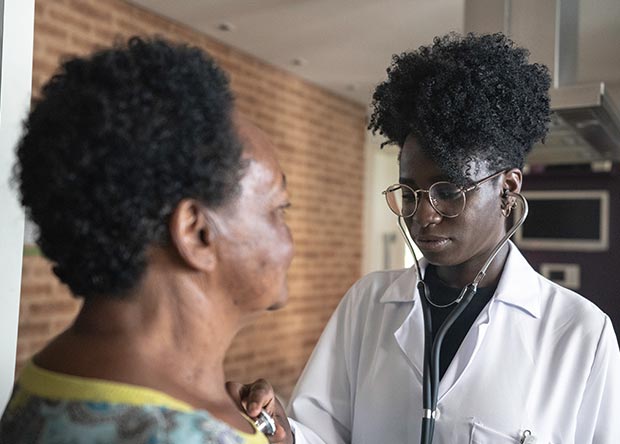Conversations with your care team
In order to take an active role in our own health, we need to be prepared. It’s important to get informed about multiple myeloma (MM) before talking with our doctors and their support team. That way, we can feel confident in speaking up for our health.
Here are some suggestions for making sure that your questions are answered:
Know the Facts:
Know the facts:
Research and read up on MM from trusted sources.
Prepare Ahead of Time:
Prepare ahead of time:
Write down all questions you want to ask and bring them to your next appointment.
Be Ready to Share:
Be ready to share:
Make it your word to show up to your appointment ready, honest, and open. Don’t be afraid to provide details that you may not even think are important—your doctor and care team may need that information to provide you with better care options.
Build care team relationships on trust:
Build care team relationships on trust:
Because MM is not curable and is a progressive disease, people with MM may need to change doctors and care teams over time. As MM progresses, so will the treatments needed to keep up with it. Building and maintaining healthy relationships with the different care team members and having a smooth transition from one care team to another will be helpful.
The keys to trusting relationships are honesty, communication, consistency, boundaries, accountability, and empathy.
Tips to building a trusting relationship with your care team:
- Communicate early and often about how MM treatment is affecting your body
- Be open and honest about how the treatment is affecting your day-to-day life
- Tell the team about your personal preferences and expectations for treatment
- Let the care team know you want to be an active participant in your care, so education and shared decision-making are important to you
- If you don’t understand something, don’t be afraid to ask them to rephrase it in a way you might be able to understand better
- Care should be human first—take a moment to learn about one another
Conversations with your care team
Questions to ask
By asking questions, we are advocating for ourselves. Our MM questions invite conversation, and there’s no better time to get clarity about MM than during our appointments with our doctor and nurses.
To get the most out of each appointment, here are a few questions you can keep in mind:
Testing for MM
- How is MM usually detected?
- Are there further tests needed to confirm my MM diagnosis?
- Are there any risks involved with testing for MM?
- Are these tests covered by my insurance plan?
- How do I prepare for MM testing?
- What should I expect from these tests?
- What will long-term monitoring look like, and what tests are needed?
Your test results
- When can I expect my blood test results?
- Will you help explain my results to me?
- If something is unusual, what are my next steps?
- Do I need to bring anyone with me to my appointment?
- How will I know if treatment is working or if I’m in remission?
About your diagnosis
- Where is the multiple myeloma located in my body?
- Has it spread? If yes, how far?
- What stage of MM do I have?
- Do I need treatment now?
- Is it possible to continue living my current lifestyle?
- Do I need to change what I eat?
Initiating treatment
- What are the goals of treatment, and how will we know if we’ve reached them?
- How many medicines should I be taking to control my MM?
- What are my different treatment options to choose from and why?
- What are the risks and side effects I can expect from treatment?
- If I experience any side effects, what should I do?
- How quickly do we need to decide on treatment?
- Where can I get my medicine?
- How do I take the medicine?
- How will we know if the treatment is working?
- How might treatment affect my daily activities?
MM treatment journey
- How do we know if a treatment is no longer working and we need to make a change?
- Are you able to administer all MM treatments available, or will I need to see another doctor or care team to get certain treatments?
- If I have to see any new doctors, how would you work with them to help co-manage my MM care?
- What is the recommended sequence of MM medicines I'll need to take over time?
- Are there any specific requirements I need to meet to be eligible to receive certain MM treatments?
- Are there any clinical trials I might be able to participate in to get access to newer medicines?
Including your care partner
- What should a care partner bring to the doctor visits?
- How can a care partner help with my MM treatment plan other than securing travel, lodging, taking notes, managing appointments, and helping with health coverage?
- What resources are available to a care partner to help them with their role?
Downloads
Conversations with your care team
Working with your care team
We have a care team at our disposal, and each person plays a valuable role. When dealing with our health, it’s good to know whom we can reach out to and how they can best help us. Here are a few team members who might help you through your health journey:
Primary care provider or general practitioner
Primary care provider or general practitioner
A doctor who sees you for common medical problems and routine exams. If you’re at risk, proactively asking your doctor about MM and bringing up any signs and symptoms you’ve been experiencing may be the first step in figuring out if you require testing.
Hematologist-oncologist
Hematologist-oncologist
A doctor who specializes in treating cancers of the blood. They have extra training in the blood system, bone marrow, and blood cancers. They are best suited to diagnose and treat your MM.
Immunotherapy treatment staff
Immunotherapy treatment staff
Care team members in this category will most likely be from an academic center or infusion center. They specialize in providing immunotherapy, and they will monitor treatments to see how they affect your body. You may meet technicians, intensive care unit (ICU) team members (if you stay at a hospital after certain treatments), and other healthcare professionals. Explore what an academic center can provide here
Advanced practice provider, nurse practitioner, or physician assistant
Advanced practice provider, nurse practitioner, or physician assistant
These are healthcare providers who have advanced training and can help you manage your health by providing you with medical services, like conducting physical exams and ordering lab work. They can also help you manage chronic conditions and make referrals to specialists if needed.
Oncology nurse
Oncology nurse
A nurse who works with you if you’re at risk of being diagnosed with cancer. In addition to providing you with necessary tests and helping administer your medicine, they manage your care team to make sure you have a personalized plan.
Nurse navigator
Nurse navigator
A member of your care team who provides resources and information to help you throughout your treatment process.
Case Manager
Case manager
A healthcare professional trained to handle the processes and requirements surrounding health insurance and healthcare coverage programs. They also know the inner workings of their healthcare facility, and can help manage the administrative needs of your care.
Counselor
Counselor
A mental healthcare professional who offers one-on-one sessions that allow you to focus on your own concerns and feelings about cancer. Couples counseling or family counseling may also be suggested to work through the changes the people around you are experiencing as you go through MM treatment.
Care partner
Care partner
A close family member or friend who will help the person with MM through treatment and acts as a point person for communication and general assistance.
Don’t forget your care team also includes your doctor’s office staff who can help you with paperwork and verifying insurance coverage, as well as the patient support team available to you from the maker of the medicine you take.
Remember, your care team can also include family, friends, and multiple myeloma advocacy organizations. While an MM diagnosis might be tough to deal with, you are surrounded by many who can help look after your well-being and lift you up.

Questions to ask your doctor and care team
Check out the MM self-advocacy empowerment guide.


